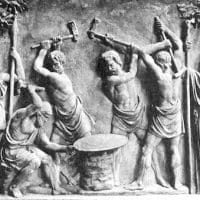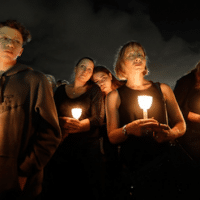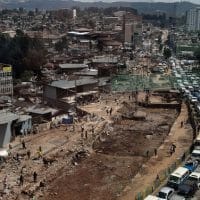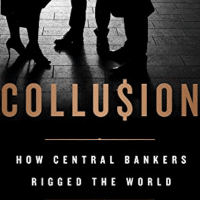-
2008 financial collapse all over again…? We need to understand the student loan speculation bubble
For those who may have missed it, a major economic indicator emerged regarding student loan debt last week. Excessive debt, like student loans, has become one of the biggest barriers to current economic growth in the United States. On Thursday, March 1, 2018, the Chairman of the Federal Reserve, Jerome Powell, appeared before U.S. Congressional representatives.
-
Utopia and healthcare (part 1)
I’ve written quite a bit about the U.S. healthcare dystopia over the years—including a seven-part series back in 2016.* But I haven’t yet addressed the utopian dimensions of healthcare reform.
-
The poison and the tomb
It takes three days on the open sea to journey from the Marshall Islands capital to Enewetak Atoll. You can’t see the atoll until you’re just miles away as it’s only feet above sea level. As you get closer, the sun fades behind clouds and the islands are shrouded in mist. Beaches are fringed not by coconut palms but Australian pines, trees praised for soaking up salt-spray and airborne radionuclides.
-
Race traitors wanted: apply within
The term “white working class” captured much of the media analysis which sought to explain Trump’s meteoric rise and subsequent victory to the highest office in the United States. The obsession with polling and voting trends based in demographics is certainly nothing new.
-
Too hot to handle: Facebook mistakes Willendorf Virgin for porn
“An archaeological object, especially iconic, should not be banned from Facebook,” the Museum of Natural History in Vienna said.
-
The robot, unemployment, and immigrants
For every industrial robot introduced into the workforce, six jobs are eliminated. – Since a few days, Amazon has started Amazon Go. The idea is simple: a shop where you go in, take whatever you want from the shelves, and the cost goes automatically to a magnetic card that you carry.
-
The fight over free speech on campus
On university campuses around the world, “free speech” is becoming the favourite slogan of the right, sure to be raised during campus political controversies.
-
There is no such thing as a natural disaster
“Policies aimed at aid and reconstruction became their own forms of punishment, leaving the island more indebted, unequal, dependent and polluted than it was before the hurricane hit.”
-
Is equality enough?
Race/isms Book Forum is a new series aimed at bringing established and emerging voices together in conversation around recent work that critically engages our world’s racial scripts, past and present. The structure of the forum is straightforward. We invite three to four thinkers to grapple with a book, highlighting a section of it, and then provide the author(s) an opportunity to respond however they see fit.
-
‘Black Panther’ is not the movie we deserve
Even in a comic-book movie, black American men are relegated to the lowest rung of political regard. So low that the sole white leading character in the movie, the CIA operative Everett Ross (Martin Freeman), gets to be a hero who helps save Wakanda.
-
Finding ways to be one: The making of Cedric J. Robinson’s radical Black politics.
Historian Robin D.G. Kelley explores the radical Black politics of scholar Cedric J. Robinson—from his historical understanding of race and capitalism as inherently inseparable systems, to his vision of the possibilities of politics, rooted deep in struggles past and present.
-
The gong of history; or, what is a human?
Every great historical epoch in the freedom struggle raises the question: what is a human? The answer changes, to quote Askia Muhammad Toure of the Revolutionary Action Movement, with “the Gong of History.” Amid all the confusing din of history, a note may sound that makes it audible and intelligible.
-
School shooting: a U.S. epidemic
How does the rate of school shootings in the U.S. compare with countries where is more difficult to obtain guns?
-
Will Lebanon be the next energy war?
In 2010 the oil and gas geopolitics of the Mediterranean changed profoundly. That was when a Texas oil company, Noble Energy, discovered a huge deposit of natural gas offshore Israel in the Eastern Mediterranean, the so-called Leviathan Field, one of the world’s largest gas field discoveries in over a decade.
-
There is no such thing as a natural disaster
“Instead of considering these [events] as natural disasters we should be calling them humanitarian disasters with a natural trigger, where this natural trigger ignites and exaggerates the structural inequalities that capitalism produces along racialized, gendered, and class lines.”
-
The African Anthropocene
Every year, human activity moves more sediment and rock than all natural processes combined, including erosion and rivers. This might not shock you. In fact, you’ve probably seen similar soundbites circulating online, signals of the sheer scale of how we’re terraforming the planet in the era of the Anthropocene. Natural and social scientists argue passionately about almost everything Anthropocenic, from the nuances of nomenclature to the start-date of the new geological epoch, but most agree on one thing: the Earth will outlive humanity. What’s in doubt is how long we will populate the planet, and under what conditions.
-
Tomgram: Nomi Prins, how to set the economy on fire
There’s no way to measure just how cheery this period really is — not if you’re the CEO of a major company. Just as the World Economic Summit was opening in Davos, Switzerland, and President Donald Trump was flying in to put his mark on the moment, PwS, a global consulting firm, released its annual survey of 1,300 CEOs.
-
An apology for imperialism in a colourful package
We all know that Hollywood movies are fictional, right? Even the ones “based on actual events”? But at some level, if a fictional film references actual history and includes stunning visuals, great acting, and a powerful musical score, it can become accepted and internalized as “the truth.”
-
Thomas Friedman justifies slaughter of Arab civilians by ‘crazy’ Israel
Thomas Friedman had a column in the New York Times yesterday justifying the Israeli slaughter of Arab civilians. Israel needs to go “crazy” in its confrontation with Hezbollah and Iran in Lebanon and Syria because, “This is not Scandinavia.”
-
Bill Fletcher Jr. on Black Marxism
Veteran labor activist Bill Fletcher jr. talks about how capitalism is based on the slave trade and colonialism, the Black contribution to Marxism, and the need to organize.




















